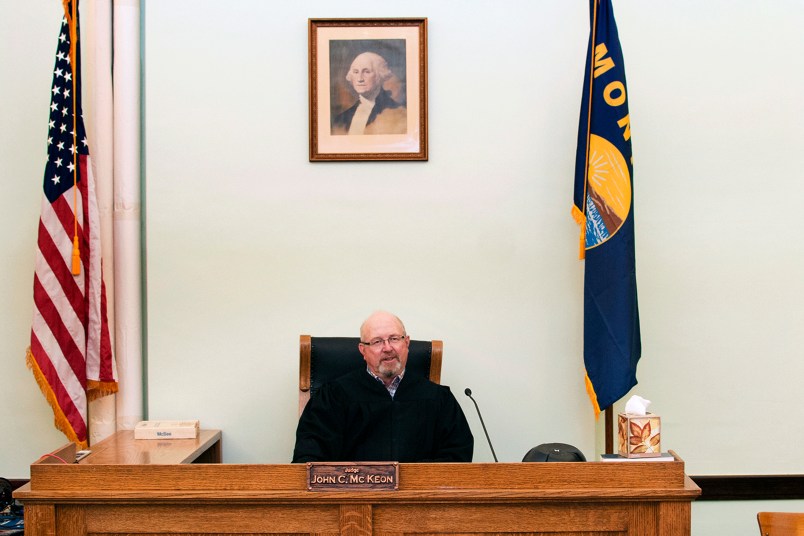HELENA, Mont. (AP) — A judge’s decision not to order prison time for a Montana man who raped his 12-year-old daughter has sparked outrage from afar and calls closer to home to toughen the state’s law, which allows such lenience in certain circumstances.
Enacted in a wave of similar legislation around the country after the killing of a 9-year-old Florida girl in 2005, the Montana statute requires a minimum sentence of 25 years in prison for anyone convicted of rape, incest or sexual abuse of a child 12 or younger.
But unlike many of those other laws, Montana’s also allows judges to dole out far less severe punishment in a case where a court-appointed evaluator determines that ordering treatment outside prison “affords a better opportunity for rehabilitation of the offender and for the ultimate protection of the victim and society.”
District Judge John McKeon, who oversees a three-county area of eastern Montana, cited that exception this month when he gave the father a 30-year suspended sentence after his guilty plea to incest and ordered him to spend 60 days in jail over the next six months, giving him credit for the 17 days already served. His sentence requires him to undergo sex offender treatment and includes many other restrictions.
Court records said the mother walked in on the father raping the child. The Associated Press is not identifying the man to avoid identifying the victim of a sexual assault.
McKeon took the rare step of issuing a statement a day after news of the Oct. 4 sentencing was widely published. In that statement and in his sentencing order, issued Monday, the longtime judge listed the factors that weighed into sparing the man prison time, including that:
— An evaluator found the defendant could be treated and supervised in the community;
— The man did not have a felony record, had a job and community support;
— The victim’s mother and grandmother wrote letters to the court supporting community-based treatment, saying it would keep the man in the lives of his two sons s and offered the family the opportunity to heal.
— Prosecutors did not challenge the results of the man’s psychosexual evaluation;
— There was a “lack of input directly from the victim” or from an advocate for the victim.
“The sentence may not be a popular decision by certain members of the general public, but it is a just and proper decision given the record before the Court and the law the Court is sworn to uphold,” McKeon wrote in the sentencing order.
An online petition arguing McKeon should be impeached has gathered more than 82,000 signatures in just over a week, from Montana, outside the state, Canada and elsewhere. McKeon had previously announced his intention to retire next month after 22 years as a state judge.
District Judge Blair Jones, the chairman of the Montana Judicial Standards Commission, said Friday that he could not disclose whether any complaints had been made against McKeon. Such complaints aren’t made public until the commission decides whether they have merit.
Nearly every state has enacted mandatory prison terms for child sex offenders, commonly referred to as “Jessica’s laws” after Jessica Lunsford, the Florida girl kidnapped and killed by a neighbor with a history of crimes against children who had failed to register as a sex offender. Many of the measures also severely restrict where such offenders can live and work, impose GPS monitoring and other conditions once they are released.
It’s not clear whether any of those laws contains an exception along the lines of Montana’s, which itself may not be on the books much longer. This week, a commission studying Montana’s sentencing laws recommended that lawmakers eliminate the exception to the 25-year minimum term, in the interest of more consistent sentencing.
Assistant Attorney General Dan Guzynski contrasted the case McKeon handled with that of a man he prosecuted last year, who received the mandatory minimum after being convicted of raping his 10-year-old daughter.
“Both (sex offender) evaluators said (the fathers) were treatable in their community, both were sentenced under the very same law, both raped their children,” Guzynski told members of the Commission on Sentencing on Wednesday. “One is going to spend the next 25 years in prison and one is out on probation.”
___
AP writer Matt Volz contributed to this report.
Copyright 2016 The Associated Press. All rights reserved. This material may not be published, broadcast, rewritten or redistributed.







Revolting development.
Isnt Trump involved in a rape case with a 10 year old victim?
Words do not convey my revulsion.
OUTRAGEOUS, more than I can express!!
The judge could have appointed someone to represent the daughter but now blames the child’s lack of input as a justification for his leniency for the rapist.
In what world is this rapist a good influence on his two young sons? Not to mention the way the girl has been abandoned by all the adults in her life.
No input from the victim? Not having appointed a representative for the victim – from outside the community if necessary – would seem to be a fundamental error. Also gotta say that the statements of support from the victim’s mother and grandmother don’t fill me with confidence in a case of repeated rapes.